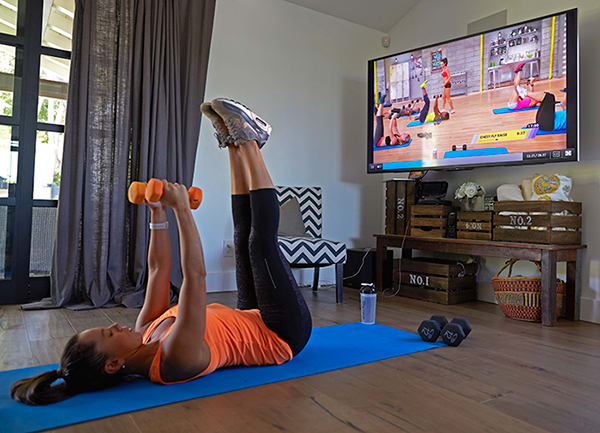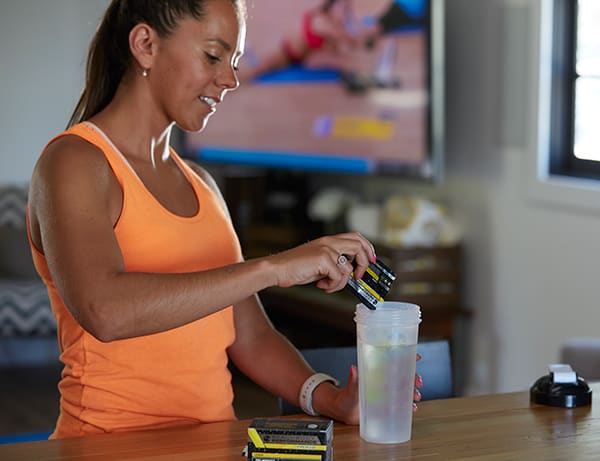So you’ve taken the first step and
started an exercise program. Congratulations! That’s oftentimes the
hardest part of getting fit. But once you’ve been doing the same thing for
a few weeks, you might want to think about upping the intensity of your
workouts to push yourself harder. Results follow performance, so if you
don’t advance your workouts, your results will stagnate.
Here Are 7 Ways to Push Yourself
Harder
1. Have a goal
Whether you want to lose weight or get
stronger, it’s a lot easier to push yourself if you know why
you’re pushing yourself. Similar to having a
personal mission statement , having a
fitness goal will help you stay on track and focused. Write it down. Tell your
friends and family. Give yourself accountability. It’s important to have a
goal that’s concrete, specific, and
attainable . Don’t say, “I want
to lose weight.” Instead, specify how much weight you want to lose and in
what amount of time. This will let you measure your progress and keep you
motivated through a period of time.
2. Have a plan
Once you’ve picked a goal,
it’s time figure out how you’re going to reach it. Use a
fitness program or connect with a trainer.
Fitness shouldn’t be random; it should be planned. Start with something
that’s on an appropriate level for your current fitness ability. If
you’re just starting out, you could try a program like
21 Day Fix or
PiYo . If you’re at a higher fitness
level, a program like
CORE DE FORCE or
INSANITY would be appropriate. Just like
you wouldn’t run a marathon without training for it, you shouldn’t
jump off the couch and into the most intense workout possible. “The
toughest part of an exercise program is seeing it through to the end, so you
don’t want to sabotage it by making things too tough out of the
gate,” says Steve Edwards, Beachbody’s VP of Fitness and Nutrition.
“Basically, just doing it is plenty… at first.”

3. Switch it up
Once you’ve become comfortable
with the workouts, then it’s time to start pushing yourself a little bit
harder. But remember, you have to work up to it first. Depending on how fit you
are in the beginning, the amount of time you should wait before you ramp up the
intensity varies. “It takes your body between three and 12 weeks to adjust
to new exercise,” Edward says. “The fitter you are, the quicker you
respond. With that in mind, you’ll want to schedule a program that mixes
things up from time to time.”
Edwards explains that it’s easy to
make your muscles sore in the beginning of
a program, but you always want to keep a little bit in reserve. “You want
a little soreness, but not too much,” he says. “As soon as
you’re not getting sore anymore, pick up the intensity.”
There are a few ways to crank your
workouts up a notch. You can go faster, jump higher, or simply lift more
weights. “Change bands or
add weight so you’re close to
failing, and sometimes fail, near the end of every set,” Edwards says.
“This added intensity will force your body to adapt and turn that
improvement line skyward.”
Another way to push yourself to the max
is by combining multiple workouts into one day. This is a great idea,
especially if you’re training for something like a
triathlon , Spartan race, or
BODathon .
4. Focus on all the pieces
When you’re pushing your body to
its limits, you need to give it everything it needs. This includes rest and
correct nutrition. For a shorter program, like
21 Day Fix, you don’t really need to
incorporate rest days into your workout schedule. However, longer programs,
like
P90X,
TurboFire, and the
BODathon training schedule, have recovery
weeks built into them.
Active recovery allows your body to keep
moving, but it also helps your muscles become refreshed and reenergized.
In addition to taking care of your
muscles, you also need to fuel them. Food fuels your body, but only clean food
will give you the fuel your body needs to push yourself as hard as possible.
“
Junk food is referred to as ‘empty
calories’ because it tends to be low in vitamins, minerals, and other
nutrients,” explains Denis Faye, Beachbody’s Director of Nutrition
Content. “Missing some of those nutrients, such as iron or various
B12 vitamins , has a direct effect on
energy levels. Other nutrient deficiencies can be more insidious, like the way
a lack of iodine might eventually impact your thyroid.”
Not only do you need to eat the right
kinds of foods, you also need to eat the right amounts. To have the energy to
push yourself hard, you need to eat enough so you don’t feel lethargic or
unfocused. “Plateaus are a pretty good indicator that you’re
under-eating,” Faye says. A
fitness plateau is when you’re not
losing any weight, but you’re not gaining it, either. By upping your
calorie intake, you can give your body more fuel to help you effectively power
through tough workouts. If you want an easy way to figure out how much and what
kind of food you should be eating, the
Portion Fix Eating Plan is simple, and
doesn’t require you to count any calories.
5. Get reinforcements
Supplements can be extremely helpful
when your body is exerting lots of energy for a long time. They can help
push you through longer workouts , but
supplements aren’t just for endurance
athletes — they can be just as helpful (and important) for any shorter
workout regime. Pre-workout drinks, like
Beachbody Performance Energize , can pump
you up to go all out in a workout. An extra boost of energy can do wonders when
you’re lifting heavier weights or doing cardio for longer than you’re
used to.
And when you start feeling the soreness
that was mentioned earlier, you don’t have to suffer through it all alone.
Beachbody Performance
Recover and
Recharge help reduce post-workout muscle
inflammation, and also help with the muscle-rebuilding process. So not only
will this help you recover faster and
relieve muscle soreness , but your muscles
will also get an extra boost to become even stronger.

6. Stay motivated
Fitness can be just as much of a mental
exercise as it is physical. Some days you’ll just want to give up, but
that’s when it’s key to push yourself. There are many
tips to help you stay committed to your goals
— take some time to figure out what works to keep you motivated. Keep
your eye on the prize so you can reach the goal you originally set for
yourself. “There’s only one way to get there and that’s by
exercising and watching what you eat,” Edwards says.
7. Stay safe
Although challenging your body helps
your fitness improve and progress, you should never push yourself to
the point of injury . “You need to
learn the difference between good pain, which is being sore, and bad pain,
which signals an injury,” Edwards says. “Good pain gets better over
time. Bad pain gets worse.” He explains that this is why it’s
important to start your program with some caution, and then build up steadily
as your body gives you feedback. “Exercise is a constant dialogue with
yourself,” he says.
If you have a hard time deciphering the
good pain and the bad, it can be very useful to have a trainer or to
follow a program without veering off
course. “It gets tricky, however, once you finish a program,” Edwards
adds. If you’re in great shape and want to keep going, that can be fine,
but it can also be a good idea to give yourself some
rest and recovery to see how your body
really feels. “This doesn’t mean no exercise, but it means to slow
down a bit and reflect,” he says. “It’s why many of the
Beachbody programs come with suggestions
for maintenance schedules.”
Your body is capable of great things,
so you shouldn’t sell yourself short. Follow these tips to push yourself
harder and make your body the best it can be!